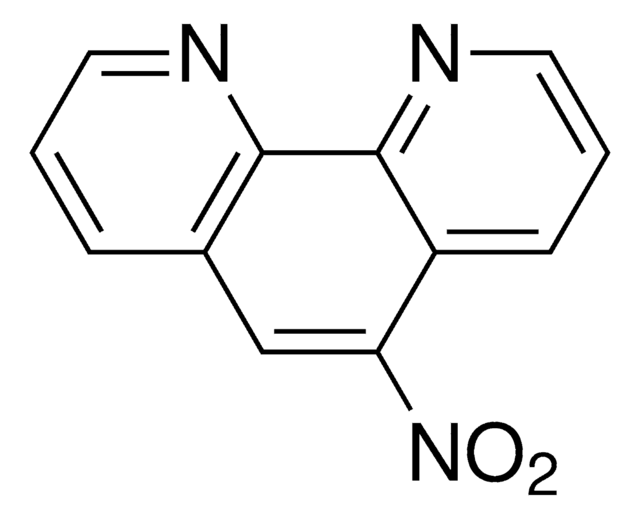658529
4-Methyl-1,10-phenanthroline
97%
Synonym(s):
4-Me-phen
Sign Into View Organizational & Contract Pricing
All Photos(2)
About This Item
Empirical Formula (Hill Notation):
C13H10N2
CAS Number:
Molecular Weight:
194.23
MDL number:
UNSPSC Code:
12352100
PubChem Substance ID:
NACRES:
NA.21
Recommended Products
Assay
97%
mp
143-145 °C (lit.)
SMILES string
Cc1ccnc2c1ccc3cccnc23
InChI
1S/C13H10N2/c1-9-6-8-15-13-11(9)5-4-10-3-2-7-14-12(10)13/h2-8H,1H3
InChI key
NAZZKEZTSOOCSZ-UHFFFAOYSA-N
Looking for similar products? Visit Product Comparison Guide
Related Categories
General description
4-Methyl-1,10-phenanthroline (4-Mephen) is a methyl substituted phenanthroline commonly used as a ligand.
Application
4-Methyl-1,10-phenanthroline (4-Me-phen) may be used in the preparation of:
- 4-carboxy-1,10-phenanthroline (mcphen)
- 1,10-phenanthroline-4-carboxaldehyde
- [4-methyl-OP)2Cu]2+, a copper-phenanthroline complex
Signal Word
Warning
Hazard Statements
Precautionary Statements
Hazard Classifications
Acute Tox. 4 Oral - Eye Irrit. 2 - Skin Irrit. 2 - STOT SE 3
Target Organs
Respiratory system
Storage Class Code
11 - Combustible Solids
WGK
WGK 3
Flash Point(F)
Not applicable
Flash Point(C)
Not applicable
Personal Protective Equipment
dust mask type N95 (US), Eyeshields, Gloves
Choose from one of the most recent versions:
Already Own This Product?
Find documentation for the products that you have recently purchased in the Document Library.
Customers Also Viewed
Triple-Helix Directed Cleavage of Double-Stranded DNA by Benzoquinoquinoxaline-1,10-phenanthroline Conjugates.
Zaid A, et al.
Chembiochem, 5(11), 1550-1557 (2004)
Spectral and electrochemical behavior of copper (II)-phenanthrolines bound to calf thymus DNA. [(5,6-dimethyl-OP)2Cu]2+(5,6-dimethyl-OP=5,6-dimethyl-1,10-phenanthroline) induces a conformational transition from B to Z DNA.
Mahadevan S and Palaniandavar M.
Inorganic Chemistry, 37(16), 3927-3934 (1998)
New Ru(II) phenanthroline complex photosensitizers having different number of carboxyl groups for dye-sensitized solar cells.
Hara K, et al.
Journal of Photochemistry and Photobiology A: Chemistry, 145(1), 117-122 (2001)
Maria Marinela Lazar et al.
International journal of biological macromolecules, 131, 134-146 (2019-03-13)
Currently, biosorption is considered a leading-edge environmentally-friendly method for the low-cost remediation of wastewaters contaminated with metal ions. However, the safe disposal of metal-loaded biosorbents is still a challenging issue. In this context, our major objective was to explore the
Our team of scientists has experience in all areas of research including Life Science, Material Science, Chemical Synthesis, Chromatography, Analytical and many others.
Contact Technical Service












